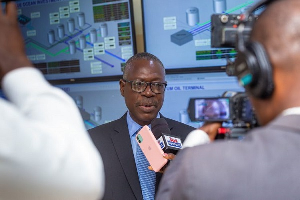 Christian Tetteh Sottie, Managing Director of SML Ghana
Christian Tetteh Sottie, Managing Director of SML Ghana
Strategic Mobilisation Ghana Ltd (SML), the indigenous audit and revenue assurance firm, has maintained its undiluted commitment to ethical business practices in the wake of the recent audit by KPMG and subsequent directives by President Nana Addo Dankwa Akuffo Addo.
While acknowledging the complexities raised in the report, SML has stressed its dedication to contributing to national and regional economic prosperity while upholding the highest ethical standards.
“SML remains confident in our ethical contributions to building a stronger Ghana for present and future generations. We are firmly committed to transparency and adhering to the strictest ethical guidelines,” a statement signed by its Director of Support Services, Yaa Serwaa Saprong.
Refutation
The KPMG audit report flagged concerns regarding SML’s operations and contractual agreements with the Ghana Revenue Authority (GRA). These concerns centred on financial aspects like compensation and pricing structures, along with the terms of SML’s contract with GRA, including duration and payment schedules.
One of the key sticking points is the issue of compensation. SML disputes the figure of GH¢1.06 billion reported by KPMG. They argue that this amount fails to account for several factors, including taxes paid by SML (31.5 percent), interest payments (32 percent), and their investments made throughout the contract period.
“The compensation of GH¢1,061,054,778.00 stated by KPMG is inaccurate. SML finds that KPMG’s failure to state GRA taxes of 31.5percent taken before payment, interest payments of 32percent plus the investment repayment made by SML, and other taxes/duties over the period creates a very unbalanced impression of the relationship between the compensation and the investment and other related costs. This omission is highly misleading,” the statement said.
The audit also appears to have corroborated previous claims about a US$100 million annual payment to SML and a 10-year contract. SML categorically denied these allegations. Beyond compensation, SML also refutes the audit’s suggestion that a proper assessment was not conducted before they were awarded the contract. They also maintain that the 2023 consolidated contract was awarded following all legal procedures.
The audit reportedly found fault with SML’s service delivery. SML rejects these claims and argues that their work not only justifies the initial contract but also led to them being awarded a separate downstream petroleum audit contract. They point to their role in providing oversight within the customs sector as evidence of their value.
SML also disagrees with how the audit measured the impact of their services on revenue collection. They argues that the audit relied on incorrect data and that their work led to a significant increase in both taxable volumes (from 207 million liters to 450 million liters monthly) and tax revenue.
“SML disagrees with KPMG’s findings regarding the realised petroleum volumes and the tax revenue realised as a result of the compliance tools that led to increased volumes. During the audit, KPMG used NPAs/ESLA Volumes to evaluate the performance of the downstream petroleum to determine GRA tax revenue,” it said.
“SML strongly contended in writing to KPMG during its audit that NPAS / ESLA’s Volumes are Lifting or Trading Volumes but not GRA Taxable Volumes. SML further contended that NPAS/ESLA Volumes cannot be used for performance computation. SML, together with the GRA, submitted to KPMG that the taxable volumes are properly evident in the Bank of Ghana’s petroleum tax revenue receipts in its Petroleum Holding Accounts,” it added.
“SML supervision within the sector showed a drastic monthly average increase of 207,885,058 to 450,175,163 in taxable volumes for the periods January to December 2019 and May 2020 to April 2021, respectively. This translates into 10,308,536,872 in excess gained volumes and excess revenue of GH¢14,844,293,095. This significant increase in monthly average taxable volumes of 450 million litre has been sustained over the past 3 years of SML’s deployment. KPMG’s reliance on incorrect data inevitably steers them towards inaccurate conclusions,” the statement further noted.
Despite these disagreements, SML acknowledges that the KPMG report does acknowledge that SML’s contract is performance-based and financed entirely by themselves.
Irrespective of the audit’s findings, SML said, it remains focused on delivering high-quality services that demonstrably benefit Ghana’s economy. The company’s performance-based contract with GRA, financed entirely without government funding, it added, underscores its commitment to results-oriented and sustainable business practices.
Furthermore, SML expressed satisfaction that its critical role in revenue assurance and national development initiatives, particularly in sectors like the downstream petroleum industry, where revenue leakages have posed historical challenges was acknowledged and preserved.
“In the final analysis, it is ennobling that both KPMG and the government did not jettison this Ghanaian undertaken of high international standards in the plugging of revenue loopholes for national development,” it remarked.